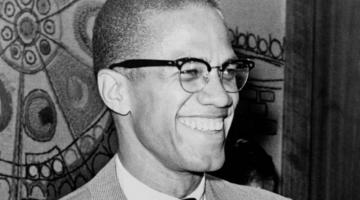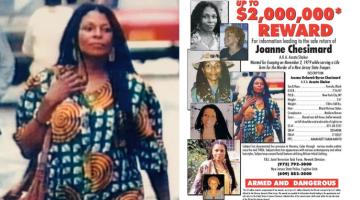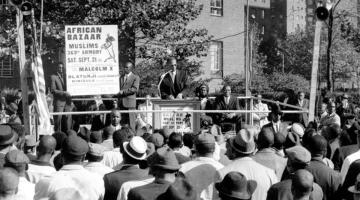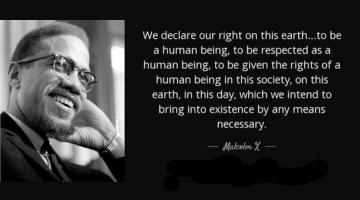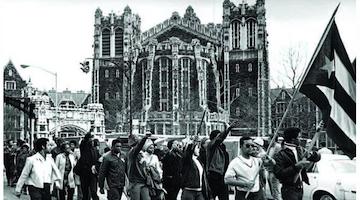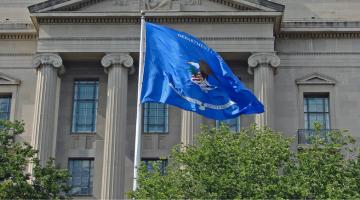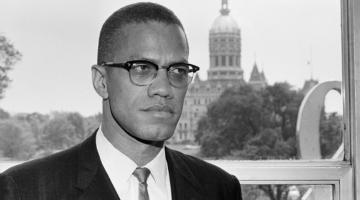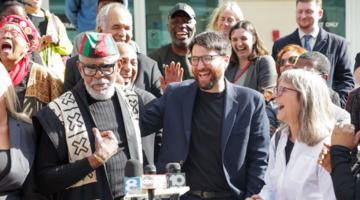United States intelligence agencies kept close watch over developments in the African American struggle for freedom, justice, equality and self-determination after the conclusion of the Second Imperialist War.
Originally published in Global Research Center.
During his stay in prison in the state of Massachusetts between 1946-1952, Malcolm X began to reflect seriously on his life’s mission.
He would join the Nation of Islam (NOI) after being urged to do so by four siblings, a fact documented in a series of letters archived in his Federal Bureau of Investigation (FBI) files which contained tens of thousands of pages.
In extensive letters written to his brothers he strongly stated that his future career would be preaching the religious beliefs enunciated by Elijah Muhammad and the Nation of Islam. After a review of its doctrine along with voracious readings on a broad array of subjects including history and public debating, Malcolm would be transformed into “Malachi Shabazz”, the name given to him by the leader of the organization.
The NOI was formed in Detroit in 1930 by a man known as W.D. Fard. His origins have been the subject of debate which extends beyond the scope of this report. Nonetheless, the advent of the NOI within the burgeoning working class African American population in Detroit during the Great Depression of the 1930s should be viewed within a broader historical and social context.
After the collapse on Wall Street in October 1929, the U.S. would be plunged into a cataclysmic economic crisis. Millions of people were thrown out of work as businesses failed along with financial institutions. African Americans were disproportionately impacted by the Great Depression prompting their involvement in various organizational forms of resistance.
Many were displaced as sharecroppers and tenant farmers in the South with the drastic fall in food prices. Even prior to the Great Depression, tens of thousands of African Americans poured into Detroit from the South seeking economic opportunities and greater freedom of movement and speech than what generally existed in the Jim Crow era.
Nonetheless, in Detroit along with countless other northern, midwestern and western municipalities, African Americans would find discrimination in the labor market, residential segregation, lack of political representation and systematic harassment and brutality by law-enforcement. Consequently, millions sought solutions to their oppression and exploitation through both material and metaphysical means. In many instances religious institutions and figures became social and political forces within the Civil Rights and Black Nationalist Movements.
Communism, Black Nationalism and the Rise of State Repression
Yet initially what brought Malcolm to the attention of the U.S. government was his letter from prison to President Harry S. Truman in late June 1950 at the beginning of the Washington-led United Nations invasion of the Korean Peninsula. The war would last from 1950-1953 when an armistice agreement was signed formally dividing the country between the socialist Democratic People’s Republic of Korea (DPRK) and western-dominated southern Republic of Korea.
In the letter Malcolm X clearly stated that he was opposed to the war against Korea. Truman was the administrator of the Cold War where the principal domestic and foreign policy objectives of the U.S. and its ruling class was to defeat the purported “global communist threat.”
In the declassified FBI files on MalcolmX, a memorandum from the Boston field office dated May 4, 1953, notes that after being paroled from prison he had moved from Massachusetts to Michigan where he resided with his brother Wilfred at 4336 Williams Street in Inkster, a majority African American suburb located west of the city of Detroit. The memorandum reveals that Malcolm was being investigated due to his possibly being a communist and for his involvement in the what the Bureau described as the “Muslim Cult of Islam.”
These inferences by the FBI were based upon a series of letters written by Malcolm while in prison. Obviously, the letters were opened by the prison authorities or by government-affiliated agencies such as the U.S. Postal Service and the FBI. See this.
Under the heading of “Communist Party Activities” the heavily redacted FBI transcription of letters from Malcolm X while in prison noted:
“Several excerpts from letters written by subject. [redaction’] these excerpts were not quotes but rather notes jotted down [redaction] on the contents of these letters. On June 29,1950, the Subject mailed a letter from which [redacted] copied the following: ‘Tell [redaction] to get in shape. It looks like another war. I have always been a Communist. I have tried to enlist in the Japanese Army, last war, now they will never draft or accept me in the U.S. Army. Everyone has always said [redaction] Malcolm is crazy, so it isn’t hard to convince people that I am.’”
In the following paragraph of the FBI documents, it continues saying:
“In January 1952 [redaction] Subject had been visited by [redaction] a member of the Crispus Attucks Club of the American Youth for Democracy. The AYD has been cited by the Attorney General of the United States as coming within the purview of Executive Order 0835. There is no further information concerning the Subject’s Communist activities in Boston.”
The AYD had come into existence during World War II when it was transformed from the Communist Party youth organization in line with the liquidation of the Party into the Communist Political Association (CPA). The military alliance between the U.S. after its direct entry into WWII and the Soviet Union brought about major shifts in the tactical approaches of communist organizations aligned with Moscow. Negotiations over the post-War geopolitical situation in Europe would bring together Joseph Stalin (USSR), Winston Churchill (UK) and Franklin D. Roosevelt.
The link between Malcolm X, the Left at that time in the U.S. and his initial involvement with the NOI while in prison and as an active member in Inkster during 1953, was a cause of concern for the FBI. Members of the NOI were cited in the FBI documents as not being willing to serve in the U.S. military. The then leader of the movement, the Honorable Elijah Muhammad, had served time in prison along with others for refusal to acknowledge the selective service laws of the U.S. government. Simultaneously, leading figures in the African American freedom struggle such as Dr. W.E.B. Du Bois, Shirley Graham Du Bois, Claudia Jones, Paul Robeson, among many others, were investigated, redbaited, blacklisted while some were imprisoned and deported at the aegis of the administrations of Truman and Dwight Eisenhower.
Paul Robeson spoke before the Paris Peace Conference in 1949 emphasizing:
“We in America do not forget that it is on the backs of the poor whites of Europe…and on the backs of millions of black people the wealth of America has been acquired. And we are resolved that it shall be distributed in an equitable manner among all of our children and we don’t want any hysterical stupidity about our participating in a war against anybody no matter whom. We are determined to fight for peace. We do not wish to fight the Soviet Union.”
Robeson’s remarks marked him for professional and political destruction by the U.S. government along with many others. These events would have a chilling impact on the political culture in the U.S. It would take a renewed African American movement for Civil Rights and Black Empowerment to shatter the fear prompted by the Cold War.
Breaking the Fear to Release the Chains of Oppressed
By mid-1955 the mood was rapidly shifting in the African American community throughout the U.S. including the South. The lynching of 14-year-old Emmett Till in Mississippi sparked outrage across the country.
Rallies held in major northern cities addressed by the mother of Emmett, Mamie Till-Mobley, drew thousands. By early December, African Americans embarked upon a Bus Boycott in Montgomery, Alabama against segregation which resulted from the arrest of activist Rosa L. Parks. Dr. Martin Luther King, Jr. would emerge as the uncontested leader of the Civil Rights Movement although many of the actions occurring in the mid-to-late 1950s were taking place on the local level.
Malcolm X often challenged the Civil Rights Movement over its tactics and objectives. He refused to accept nonviolence as a tactic or strategy. However, the growth of the NOI and the mass Civil Rights Movement was representative of the rising consciousness of African Americans.
Looming over the 1954 Supreme Court Decision, Brown v. Topeka, the Montgomery Bus Boycott, the integration of major league sports and other forms of token reforms, was the rising specter of socialism and national liberation on an international scale. The independence of India in 1947 was preceded by the liberation of North Korea and North Vietnam in 1945.
The FBI documents on the NOI from 1953 say that:
“[T]he cult teaches that the Korean War is a futile effort by the United States to prevent the coming Asiatic conquest of the world and the defeat of the United States in Korea is a prelude to the ‘resurrection’ when North America and Great Britain will be doomed and the original man, lead by Allah will reign supreme…. the following information taken from another letter of Subject which January 29, 1950: ‘It is better to be jailed by the devil for serving Allah than it is to be allowed by the devil to walk free. The black man has been enslaved. The time is coming for the devils to be destroyed.”
Such language noted by the federal government coming from Paul Robeson or the Black Nationalist religious-oriented Malcolm X of the NOI illustrates its concern related to the domestic stability of the U.S. The Civil Rights Movement of Dr. Martin Luther King, Jr. during the mid-1950s and the NOI would serve an important purpose of opening the potential for mass resistance to injustice in the U.S.
Click the share button below to email/forward this article. Follow us on Instagram and X and subscribe to our Telegram Channel. Feel free to repost Global Research articles with proper attribution.
Abayomi Azikiwe is the editor of the Pan-African News Wire. He is a regular contributor to Global Research.


